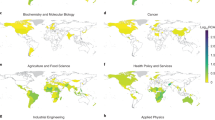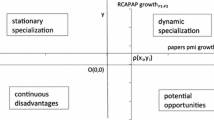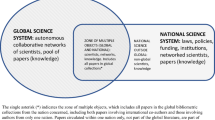Summary
Institutions and their aggregates are not the right units of analysis for developing a science policy with cognitive goals in view. Institutions, however, can be compared in terms of their performance with reference to their previous stages. King's (2004) 'The scientific impact of nations' has provided the data for this comparison. Evaluation of the data from this perspective along the time axis leads to completely different and hitherto overlooked conclusions: a new dynamic can be revealed which points to a group of emerging nations. These nations do not increase their contributions marginally, but their national science systems grow endogenously. In addition to publications, their citation rates keep pace with the exponential growth patterns, albeit with a delay. The center of gravity of the world system of science may be changing accordingly.
Similar content being viewed by others
Author information
Authors and Affiliations
Rights and permissions
About this article
Cite this article
Leydesdorff, L., Zhou, P. Are the contributions of China and Korea upsetting the world system of science?. Scientometrics 63, 617–630 (2005). https://doi.org/10.1007/s11192-005-0231-1
Issue Date:
DOI: https://doi.org/10.1007/s11192-005-0231-1




